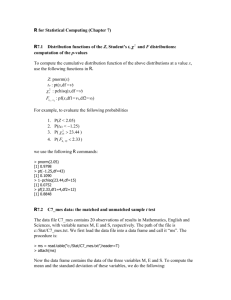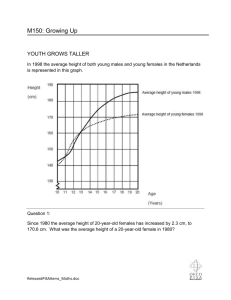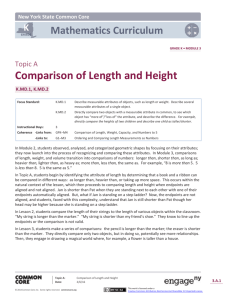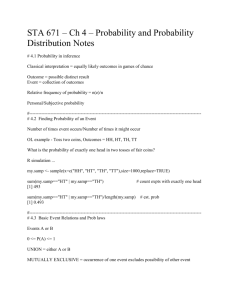Normal Probabilities
advertisement
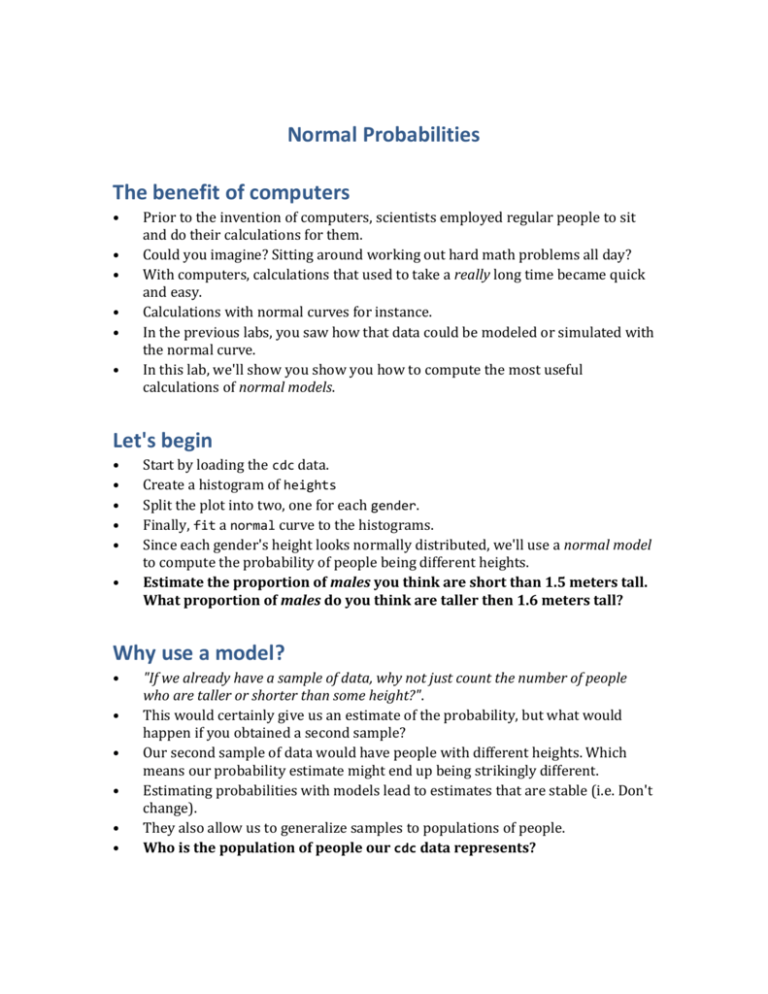
Normal Probabilities The benefit of computers • • • • • • Prior to the invention of computers, scientists employed regular people to sit and do their calculations for them. Could you imagine? Sitting around working out hard math problems all day? With computers, calculations that used to take a really long time became quick and easy. Calculations with normal curves for instance. In the previous labs, you saw how that data could be modeled or simulated with the normal curve. In this lab, we'll show you show you how to compute the most useful calculations of normal models. Let's begin • • • • • • Start by loading the cdc data. Create a histogram of heights Split the plot into two, one for each gender. Finally, fit a normal curve to the histograms. Since each gender's height looks normally distributed, we'll use a normal model to compute the probability of people being different heights. Estimate the proportion of males you think are short than 1.5 meters tall. What proportion of males do you think are taller then 1.6 meters tall? Why use a model? • • • • • • "If we already have a sample of data, why not just count the number of people who are taller or shorter than some height?". This would certainly give us an estimate of the probability, but what would happen if you obtained a second sample? Our second sample of data would have people with different heights. Which means our probability estimate might end up being strikingly different. Estimating probabilities with models lead to estimates that are stable (i.e. Don't change). They also allow us to generalize samples to populations of people. Who is the population of people our cdc data represents? Calculating probabilities with models! • • To estimate probabilities with our normal model we need to compute the mean and stdev of our observations. Calculate the mean and stdev of the males in our cdc data. ## Warning: The data contains 546 missing values ## The data contains 420 missing values • • To find the probability randomly choosing a teenage male shorter than 1.5m tall we use the pnorm function. pnorm is short for probability using a normal model pnorm(1.5, mean=1.757365, sd=0.08377103) ## [1] 0.001062 • About 0.1% of teenage males are shorter than 1.5m. Using the pnorm funciton • • • • By default, the pnorm function computes the probability of everything smaller than the value of interest. In our example, the value of interest was 1.5. So pnorm gave us the probability that an American teenage male would be shorter than 1.5m tall. To flip this, and find the probability of finding someone taller than 1.5m tall, we write: pnorm(1.5, mean=1.757365, sd=0.08377103, lower.tail = FALSE) • Compute the probability of randomly selecting a male that is taller than 1.6 meters tall. How did your estimate compare? Going the other way • • • • • Now you know how to take a value and compute a probability. Next we'll flip this, and use a probability to compute a value. We'll start by calculating the tallest height, in meters, a male could be and still be in the shortest 10% of males We'll do this using the qnorm function (which stands for quantile of a normal probability) To find out how tall the shortest 10% of males are: qnorm(0.10, mean=1.757365, sd=0.08377103) ## [1] 1.65 • 10% of men are shorter than 1.65m. Using the qnorm function • • • Just like the pnorm function, qnorm by default will always default to computing values starting from the left. Which is why 1.65 m was the height in which 10% of our male teenage population is shorter than. Also just like pnorm we can find the height which 10% of the teenage males are taller than by writing: qnorm(0.1, mean=1.757365, sd=0.08377103, lower.tail = FALSE) • Find this value on the histogram. What does it mean for 10% of teenage boys to be taller than this height? On your own • • • • Compute the following using a normal model for the heights of females: What's the probability that a randomly chosen female will be shorter than 1.5m? What percentage of females shorter are than 1.78m and taller than 1.48m? What's proportion of teenage females are shorter than the mean height of teenage males?
